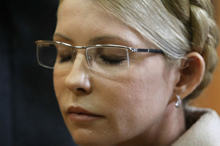No Excuse for Not Releasing Tymoshenko

President Yanukovych has stated that „it is impossible to consider the question of a pardon until all court proceedings in the Tymoshenko cases have been concluded”.
This only fuels doubts regarding the competence of the President’s advisers, both political and legal.
While Yury Lutsenko’s release, albeit as a “pardon”, has been warmly welcomed by the EU, it is not by any means enough to remove the major impediments preventing the signing of the EU-Ukraine Association Agreement. While the former Prime Minister and opposition leader, Yulia Tymoshenko remains imprisoned on charges pertaining to a political decision, concerns about politically motivated prosecutions and selective justice will not be allayed.
The President’s legal consultants are also giving him bad advice, though the same position has already been presented by Valeria Lutkovska, Human Rights Ombudsperson.
It was she who was quoted by the President on 5 April as having asked for Lutsenko’s pardon on health grounds.
She later explained to Kommersant Ukraine that she was able to take this step because all legal avenues in Ukraine were now closed to the former Interior Minister. On 5 April this was not in fact quite true since only one of Mr Lutsenko’s cassation appeals had been turned down. The cassation appeal against the second conviction was rejected on 10 April.
Since Ms Lutkovska has justified non-intervention in this case and others on the grounds of the clause in the Law on the Human Rights Ombudsperson which prevents her dealing with a case before the courts, her hands were only in fact freed on 10 April.
It would be churlish to focus on this since her intervention meant that Lutsenko walked free after more than two years in captivity on Sunday 7 April.
Nonetheless, any arguments suggesting that Ms Lutkovska cannot ask for a pardon and that the Commission cannot make such a recommendation to the President with respect to Yulia Tymoshenko are untenable.
It is worth noting that the Ukrainian Helsinki Human Rights Union which is made up of 30 different NGOs has issued an appeal for a pardon, citing Ms Tymoshenko’s state of health and pointing out that she has already served a considerable part of her sentence. UHHRU is thus referring to the only case where Tymoshenko has been convicted by a court of law.
The argument presented both by Ms Lutkovska and by the President regarding other court cases is surely flawed. The former Prime Minister was found guilty in October 2011 of charges relating to the 2009 gas accords with Russia and sentenced to 7 years imprisonment. With respect to that case, all legal avenues have been exhausted, with the cassation appeal rejected in August 2012. The European Court of Human Rights judgment is awaited and there is nothing to stop Ms Lutkovska from seeking a pardon, nor the President granting it.
The precedent has, after all, been set with Lutsenko’s pardon being issued on the basis of an appeal from the Ombudsperson and not on his personal request.
Yes, there are outstanding charges against Yulia Tymoshenko. There is also Article 62 of Ukraine’s Constitution which states clearly that “a person is presumed innocent of committing a crime and shall not be subjected to criminal punishment until his or her guilt is proved through legal procedure and established by a court verdict of guilty”.
Even if we are faithful to the same principle and assume that the two ongoing criminal cases are not politically motivated, Ms Tymoshenko has not been convicted of any crime. With respect to the accusations now forming the grounds for a somewhat surreal “pre-trial court examination”, Yulia Tymoshenko does not appear to have even been formally charged with ordering the murder of MP and businessman Eugene Shcherban in 1996.
Certainly, Ms Tymoshenko is under an indefinite detention order over the second criminal case involving charges of embezzlement and tax evasion with respect to her company United Energy Systems of Ukraine. The fact that all democratic countries have expressed scepticism regarding the motives for these charges is only part of the problem. The indefinite detention order was produced in an extraordinary stunt involving a “court hearing” in Ms Tymoshenko’s cell in November 2011.
All of the alleged offences which the former Prime Minister is now accused of took place in the 1990s. They did not prevent her serving for a number of years as Prime Minister nor of standing for office in the Presidential elections. It is therefore incomprehensible why they would justify her detention in custody in 2013 were a pardon to be issued, especially if that entirely possible pardon were on health grounds.





